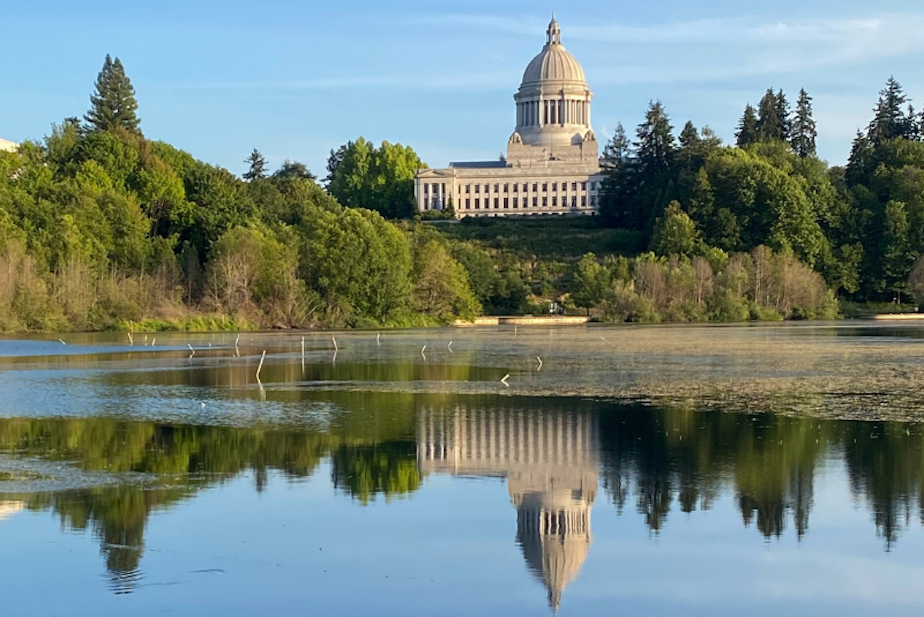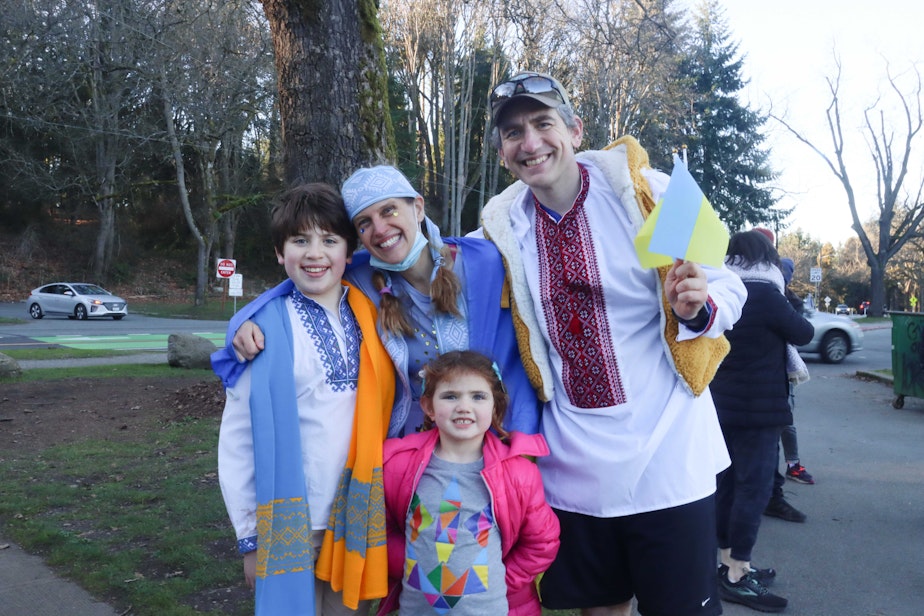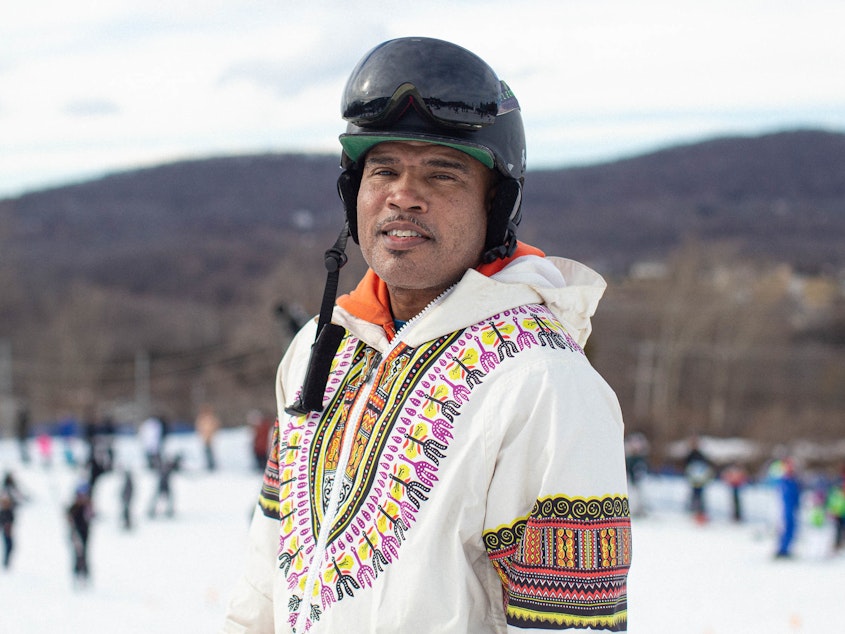Politics AND news AND Trump's revenge: Today So Far

- What was in Seattle Mayor Bruce Harrell's first State of the City address?
- Bills that have died and survived so far in Olympia.
- Trump's revenge in Washington state has two targets.
This post originally appeared in KUOW's Today So Far newsletter for Feb. 16, 2022.
Let's talk politics today.
Seattle Mayor Bruce Harrell delivered his first State of the City address yesterday. Aside from some comments about hiring new police officers and responding to homelessness, the speech was a bit short on new revelations. At times, Harrell said that more plans are coming soon. It feels like the purpose of the speech was more about setting a tone. Just as Harrell emphasized in his campaign, he was sending a message of unity. He addressed each council member by name, said something complimentary about them, and noted their hard work. It stood out, given the sometimes tense relationships between Seattle's mayors and the City Council. Within that theme was "the politics of AND." The mayor is attempting to get beyond an either/or mentality in Seattle, and argue that people can work together.
"The right number of officers and the right kind of officers. More housing and vibrant, unique neighborhoods. Climate justice and new jobs. Diversity and commonality."
Since he brought it up, I just want to point out that Seattle can have more dense housing and make them look appealing — unlike what we're getting now which looks like reclaimed siding from a Quonset hut.
The legislative session in Olympia is past its halfway mark, and lawmakers are shedding bills left and right. Housing advocates had hope for two bills, one in the Senate and another in the House, that would open up more "middle" housing throughout the state (dense housing like duplexes, triplexes, and more). It's one solution to the state's housing crisis. The Senate bill died a couple weeks ago, and now the House bill has been tossed aside, too. So no housing solutions this year.
Sponsored
Another high-profile bill died this week, thwarting Gov. Jay Inslee's mission to outlaw misinformation from elected officials. It might stand a better chance in the future if lawmakers tighten up the language — there's that whole freedom of speech thing they need to address. There are other corners of our society where speech is restricted to some degree, however. Reporters and news outlets, for example, can be sued for libel and other charges related to what they publish. The plaintiff has to prove that what was published was said with malice. And that can be challenging. But it's one reason why I think this effort to nix election lies may come back around at some point.
There are a few other bills still in play in Olympia, ranging from gun control to policing, and the issue of missing and murdered Indigenous people. Read more here.
It has been said that President Trump is planning his revenge for the 2020 election (which he lost) through the 2022 election. And Trump's revenge has two targets in Washington state. He is backing candidate Joe Kent for the 3rd Congressional District. The incumbent is Republican Jaime Herrera Beutler, who voted to impeach the former president. That hasn't sat well with Trump and his supporters.
Trump also has his sights set on the 4th Congressional District where Loren Culp is challenging incumbent Republican Dan Newhouse, who also voted to impeach. After losing the gubernatorial race to Inslee in 2020, Culp also spread allegations, with no evidence, that the election in Washington was stolen. Some local GOP members, however, are taking it upon themselves to push back against these Trump-backed candidates. KUOW's David Hyde has the full story here.
Have a comment or want to reach out to me? Send me an email at dyer@kuow.org.
Sponsored
AS SEEN ON KUOW

Tamara Cyhan-Cunitz with her daughter Karina, son Ben, and husband Bryan at Green Lake Park. Seattleites recently held an event called "The Marathon in New York No One Wants to Run," referencing the small town of New York in Ukraine, not far from the border where Russian soldiers have amassed. (Natalie Newcomb / KUOW)
DID YOU KNOW?
This story is nearest to my heart. Jack Daniel’s is America’s best-selling whiskey. It is world renowned. Its iconic label radiates Americana. But despite bearing Daniel’s name, much of the credit for its original craft and flavor goes to "Uncle Nearest."
Nathan “Nearest” Green was born into slavery in Tennessee. He worked under the purview of a preacher who had some side operations, such as moonshining. At some point in the 1850s, a boy named Jasper, slightly younger than Green, came to work for the preacher. Green taught Jasper everything he knew about distilling, including a unique method known today as the Lincoln County Process — filtering whiskey through charcoal made from sugar maple wood. It is theorized that this method goes back to West African traditions.
After the Civil War, Green was free and Jasper returned, going by the name Jack. He offered Green a job as the master distiller at his new distillery. Green became the first authority to produce Jack Daniel’s Tennessee Whiskey. His sons came on board too and it became a family tradition. Since then, seven generations of Green’s descendants have consistently worked for Jack Daniel’s. As of 2017, three descendants were working there.
For generations, the credit Nearest deserved was only known among hardcore whiskey fans. Recently, a new brand of whiskey, not associated with Jack Daniels, emerged bearing Uncle Nearest’s name, aiming to raise his profile. The master blender at that distillery is Victoria Eady Butler, Nearest’s great-great granddaughter and the first Black woman to hold that title at a distillery (side note: her main career was an Analytical Manager at the Department of Justice). Jack Daniel's and Nearest Green distilleries have now joined forces to start a distilling school with the goal of fostering more diversity in the whiskey industry.
ALSO ON OUR MINDS

Snowboarding was his passion. Making the sport more inclusive became his mission
Brian Paupaw and Omar Diaz spend their weekends shuttling kids from Brooklyn to upstate New York and northwest New Jersey for a day in the mountains. Together, the two men have provided kids from low-income communities with the opportunity to get into snowboarding, keeping them on the slopes and off the streets through their Hoods to Woods Foundation.

